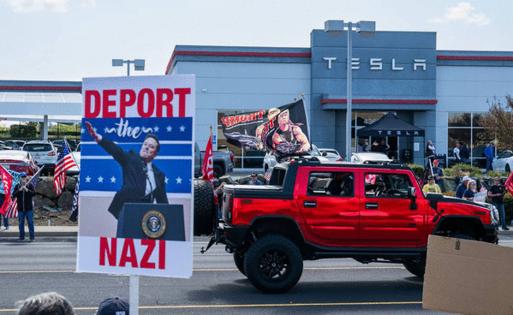Is spraying graffiti on a Telsa actually 'domestic terrorism'? What California law says
Published in News & Features
SACRAMENTO, Calif. — Is spray painting graffiti on a Tesla to criticize Elon Musk a valid form of protest — or domestic terrorism?
President Donald Trump and his administration have denounced widespread attacks on Tesla vehicles, charging stations and dealerships.
Musk has faced ire in recent months for his role in the U.S. Department of Government Efficiency’s efforts to slash federal spending by firing thousands of government workers and threatening to close multiple agencies, including in California.
In California, people have protested against the tech billionaire at Tesla dealerships across the Sacramento area, San Francisco, and Los Angeles, as part of movements including the Tesla Takedown campaign.
Though demonstrations have been relatively peaceful, U.S. Attorney General Pam Bondi labeled targeted attacks on Tesla dealerships and vehicles as “nothing short of domestic terrorism.”
“The days of committing crimes without consequence have ended,” Bondi said in a March news release. “Let this be a warning: if you join this wave of domestic terrorism against Tesla properties, the Department of Justice will put you behind bars.”
In March, federal prosecutors filed charges against three people accused of using Molotov cocktails to set fire to Tesla cars and charging stations in Colorado, Oregon, and South Carolina.
At a White House media event in March, Trump said anti-Musk protesters were “harming a great American company” and warned that anyone using violence against the electric car manufacturer would “go through hell,” the BBC reported.
Is vandalizing a vehicle considered free speech? Can you go to jail for keying a car?
Here’s what California law says:
What is domestic terrorism?
The FBI defines domestic terrorism as “violent, criminal acts committed by individuals and/or groups to further ideological goals stemming from domestic influences, such as those of a political, religious, social, racial, or environmental nature.”
While domestic terrorism is defined in federal law, it’s not an official criminal statute that carries a specific penalty.
Under federal statutes, each count of conspiracy and malicious destruction counts carries a mandatory penalty of at least five years in federal prison, with a maximum sentence of 20 years in prison.
A count of possession of an unregistered destructive device — ranging from firearms to bombs and grenades — is punishable by up to 10 years in prison.
Does California have a law banning domestic terrorism?
In the United States, a total of 32 states and Washington, D.C., criminalize the act of domestic terrorism, according to the International Center for Not-for-Profit Law.
Although California does not have a specific domestic terrorism law, the state outlaws criminal threats “that place victims in reasonable and sustained fear for their safety or the safety of their families,” according to California Penal Code.
The state law, however, does not apply to constitutionally protected speech, according to Southern California law firm Shouse Law Group.
“This law only targets individuals who try to instill fear in others, not those who engage in “mere angry utterances or ranting soliloquies, however violent,” Shouse Law Group said.
What are the penalties for vandalism in California?
California Penal Code defines vandalism as the act of “maliciously” damaging, destroying or defacing someone else’s property.
Vandalism in California is considered a misdemeanor if the amount of damage is less than $400. The charge can be elevated to a felony if the damage is $400 or greater.
In California, acts of vandalism include:
—Graffiti
—Breaking a window or door
—Damaging trees
—Keying a vehicle
—Tampering with equipment such as vending machines
Penalties for misdemeanor vandalism can include up to one year in jail, a maximum $1,000 fine, or up to $5,000 if you already have a prior vandalism conviction.
If the crime is a felony, the penalties can range from probation to up to three years in jail and a maximum fine of $10,000 or a $50,000 fine if the damage is $10,000 or more.
If you’re convicted of misdemeanor criminal threat, you could serve up to one year in jail and a $1,000 fine. A felony carries a penalty of up to three years in prison and a $10,000 fine.
Can you go to jail for damaging a car?
Vandalizing a motor vehicle is often charged under a different section of California’s Vehicle Code that makes it a misdemeanor to “damage, deface or destroy a vehicle without the owner’s consent,” according to Shouse Law Group.
If convicted, you could get your California driver’s license suspended for up to two years.
While the First Amendment protects your right to express your opinion, even if it’s unpopular, it does not extend to “true threats or speech that incites imminent violence or law-breaking,” according to the American Civil Liberties Union of Northern California.
Can I legally protest at a Tesla dealership?
The First Amendment to the U.S. Constitution guarantees freedom of religion, speech and the press, in addition to protecting the right for people to “peaceably” assemble and petition the government.
However, the First Amendment doesn’t give you the right to engage in protests or other free speech activities on private property, such as a Tesla dealership, unless you own it or the owner has granted permission to use it, the ACLU of Northern California said.
____
©2025 The Sacramento Bee. Visit at sacbee.com. Distributed by Tribune Content Agency, LLC.







Comments